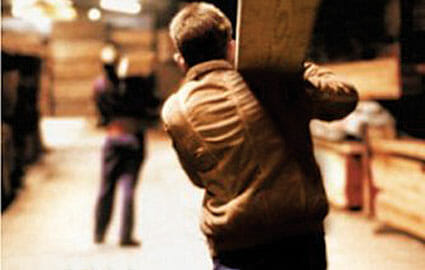The Son (Le Fils) (DVD)

Since Jean-Pierre and Luc Dardenne’s movie The Son played in theaters last year, I’ve thought about it more than any other movie in recent memory, which seems appropriate for a work relying so heavily on the viewer’s imagination.
Much of the film’s magic is in how its story unfolds, so the less said about the plot, the better. It starts simply. A man named Olivier teaches carpentry to teenage boys. He examines their work. He demonstrates proper technique. He’s quiet and meticulous. Maybe this is a training program for kids who’ve had some trouble in their lives, but the Dardennes are far too subtle to spell that out. Instead they follow Olivier as he helps the boys measure, cut, and hammer. The camera goes where he goes and sees what he sees.
One boy in particular draws his attention. The boy has just arrived at the school, but Olivier seems to know him or know who he is, and he seems unsure about what to do when the boy wants to join his carpentry class. As the story develops, without knowing exactly why, I began to fear violence. Olivier watches the boy with a curious stare that’s hard to read, and the workshop is filled with tools and heavy machines, a potentially disastrous place to be if something ugly lurks.
-

-

-

-

-

-

-

-

-

-

-

-

-

-

-

-

-

-

-

-

-

-

-

-

-

-

-

-

-

-

-

-

-

-

-

-

-

-

-

-








































